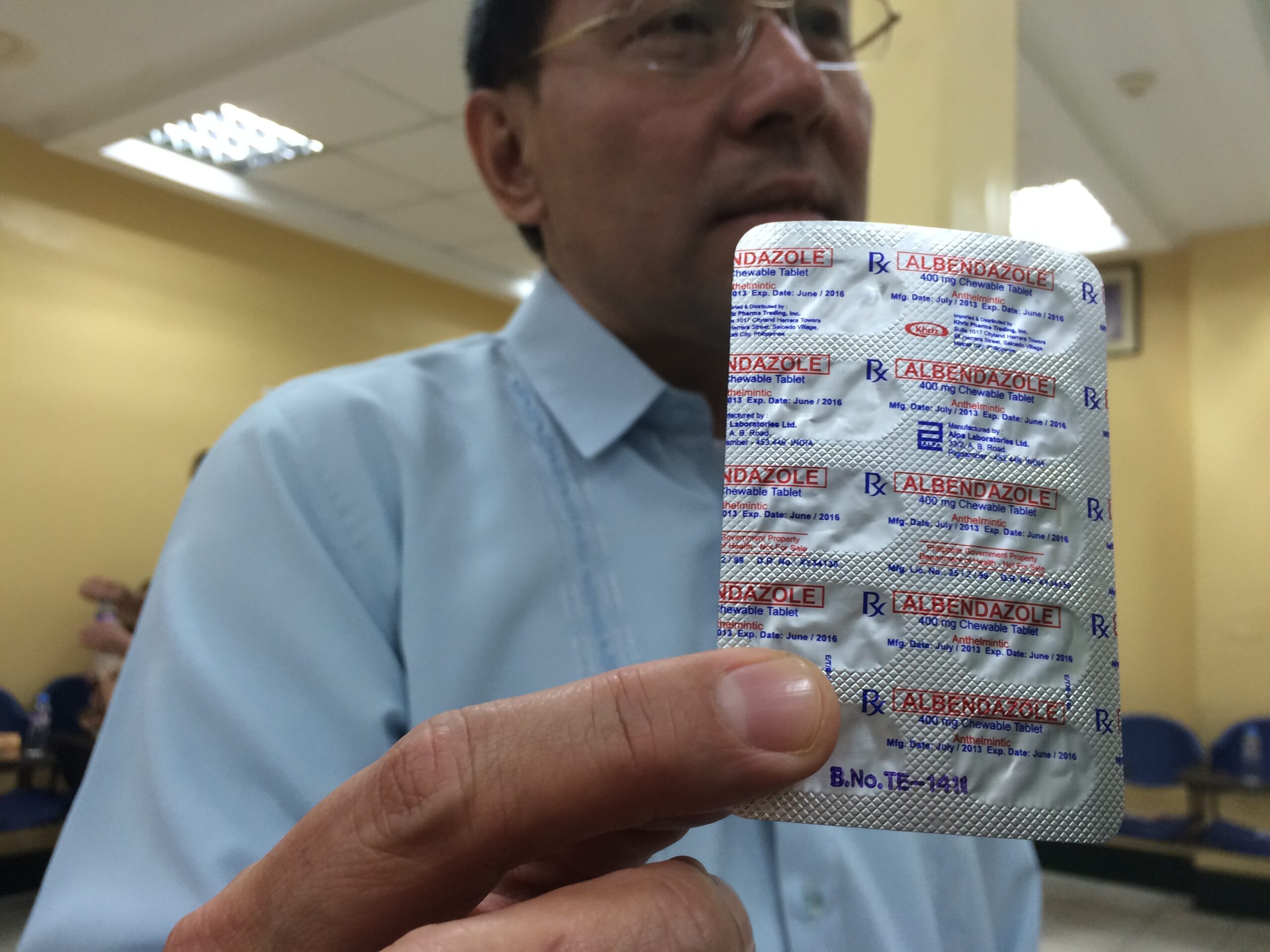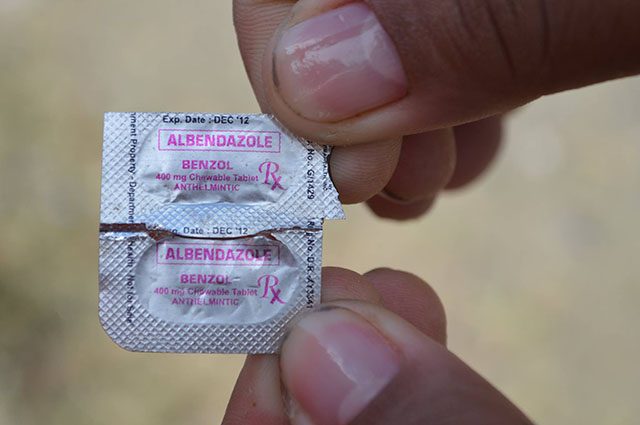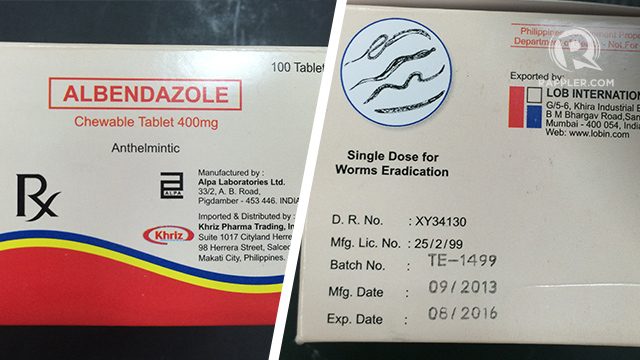SUMMARY
This is AI generated summarization, which may have errors. For context, always refer to the full article.

MANILA, Philippines – While local health executives and education officials have denied administering expired medicine to students for a nationwide deworming program, the Department of Health said on Thursday, July 30, that it is conducting a probe to determine the source of the allegation.
DOH officials were referring to a photo in Rappler’s report on Wednesday, July 29, which showed the package of deworming medicine with “Department of Health” and a brand name, Benzol. The expiration date is December 2012.
The package was shown by an angry parent whose child had been brought to the Zamboanga del Norte Medical Center, along with others who experienced nausea, stomach ache, and vomiting after taking the chewable deworming tablets.
But Health Undersecretary Vicente Belizario Jr said the medicine administered to students on Wednesday only had the generic name, albendazole, in its packaging.
“‘Yung source nga noon hinahanapan namin ng a little more lead because we’re interested in getting to the bottom of this (We’re trying to find a little more lead on the source because we’re interested in getting to the bottom of this),” he said.
Belizario said that the DOH has yet to track down the source of the package of the “expired” medicine. He added that the DOH buys medicine with a minimum of 3 years expiration, so any expired medicine should no longer be kept and should be disposed of.
Health officials said the supplier delivered the medicine to the different sites in June.
DOH Spokesman Lyndon Lee Suy said that following the department’s process of purchasing medicine, if the particular medicine expired in 2012, then it should have been bought as early as 2009 or 2010, and should have been disposed of by now.
“We’re looking into that, saan galing, kung totoong tinake yung gamot, kasi as it is claim ng local health executive doon na walang ganung pangyayari sa lugar na yun, at the same time DepEd walang ganoong binigay na gamot,” Lee Suy said.

Belizario could only presume that the photographed medicine package in the Rappler report might be from households that do not dispose medicines immediately.
“Puwedeng nanggaling sa bahay. Noong araw, pinapauwi tableta sa bahay, hindi alam kung iniinom o hindi. Ang kagandahan sa ginawa natin kahapon, kitang-kita na binibigay ‘yung gamot, kaya mas reliable yung datos,” he added.
(That medicine could’ve come from someone’s home. Parents used t bring the medicines home, so there’s no assurance they were administered. The good thing about what we did yesterday, we saw that the medicine is really being administered, so the data is more reliable.)
10 students still hospitalized
During the briefing, the DOH said only 10 students remain in various hospitals in the Zamboanga Peninsula after taking the deworming medicine.
As of 11 am Thursday, July 30, DOH said they have dewormed a total of 8,108,979 Kinder to Grade 6 students nationwide – more than half the target of 16 million students.
Of those who took the medicine, 3,637 consulted with health officials after experiencing side effects from the medicine. Of this number, 109 were admitted to hospitals.
Lee Suy said the 10 who are still confined may be discharged by Thursday.
The health department admitted this is the first time since the program started in 2006 that they observed an upsurge in the number of students that experienced side effects in one area. Officials said this could be because it’s the first time the activity was done simultaneously in one day.
“Dati over a month [yung activity], na nagiging over a 3-month period, [so] yung report ng side effects, diluted (The program used to be a month-long activity, sometimes over a 3-month period, so the reports of side effects were diluted),” Belizario explained.
Some of the reported side effects of deworming include abdominal pain, nausea, vomiting, allergy, and headache.
But the health department still considers the incidence rate of side effects very low (0.045%). This means deworming is still “a strategy that is very safe” to save children from malnutrition and poor school performance.
Belizario also clarified that not all the reported side effects are related to deworming, since some of them could be due to worm infection.
Still the “side effect is maybe a sign that the drug is taking effect,” he noted.

Lack of information
The health department is also looking at the possibility that many children experienced side effects because the medicine was not taken on a full stomach, or that the food they had eaten was not prepared well.
Belizario said that since parents had given their consent to have their children dewormed, they should have been informed of the side effects. He admitted that there might have been a lack in information dissemination in some areas on the side effects of the medicine.
“Maaari nagkaroon ng kulang na information in some areas kasi we can’t guarantee a uniform implementation in the whole country. Titingnan din namin ‘yun, saan mahina-hina na puwede nating i-strengthen sa susunod na rounds.”
(Maybe there was a lacked in information dissemination in some areas because we can’t guarantee a uniform implementation in the whole country. We’re looking at that too: weak areas that we can strengthen for the next rounds of deworming.)
Some officials in Zamboanga del Norte and Zamboanga Sibugay had observed the lack of information on the activity, particularly in terms of the side effect of the medicine, albendazole.
The next nationwide deworming activity will be in January 2016, with a target of 24 million students. – Rappler.com
Add a comment
How does this make you feel?
There are no comments yet. Add your comment to start the conversation.